人教版(2019) 选择性必修第二册Unit 2 Bridging Cultures主语从句课件(共40张PPT)
文档属性
| 名称 | 人教版(2019) 选择性必修第二册Unit 2 Bridging Cultures主语从句课件(共40张PPT) | 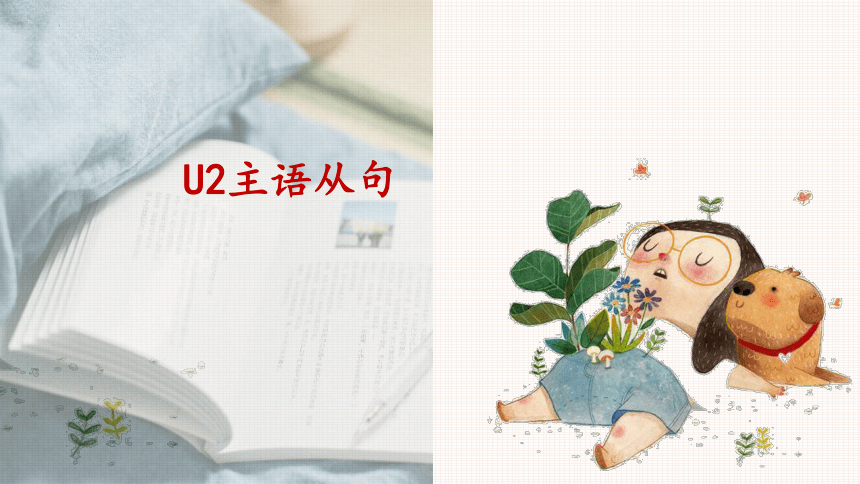 | |
| 格式 | pptx | ||
| 文件大小 | 1.2MB | ||
| 资源类型 | 教案 | ||
| 版本资源 | 人教版(2019) | ||
| 科目 | 英语 | ||
| 更新时间 | 2022-12-24 21:12:11 | ||
图片预览

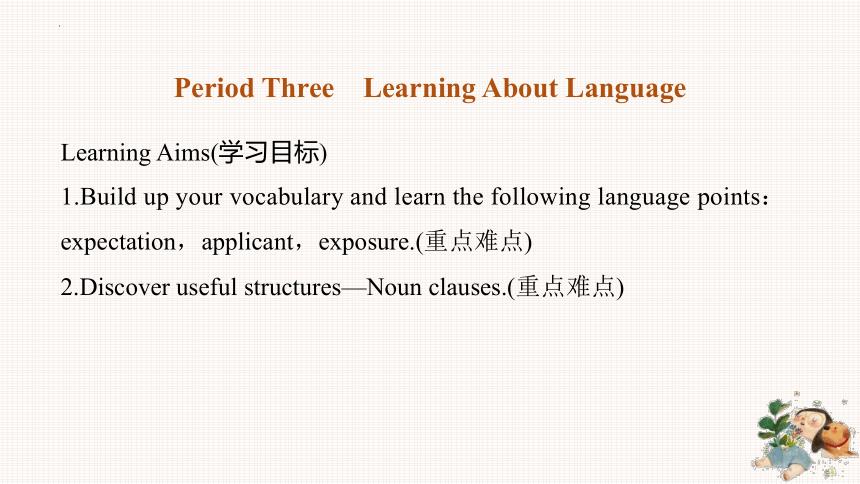
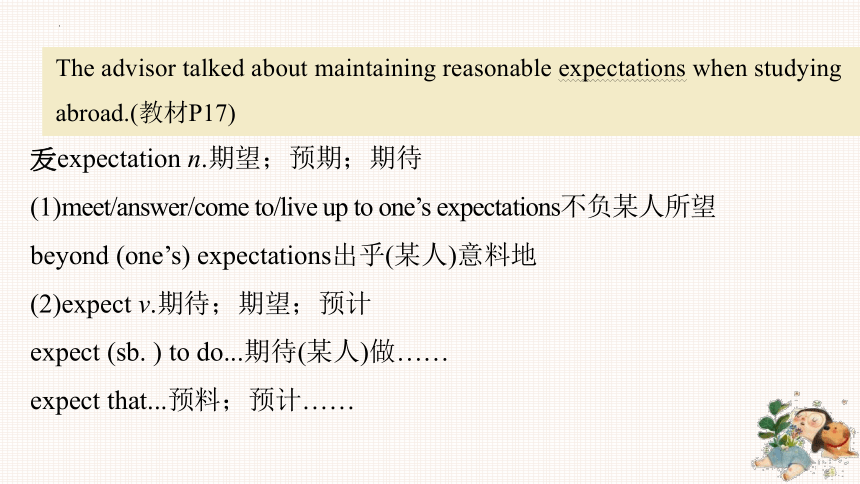
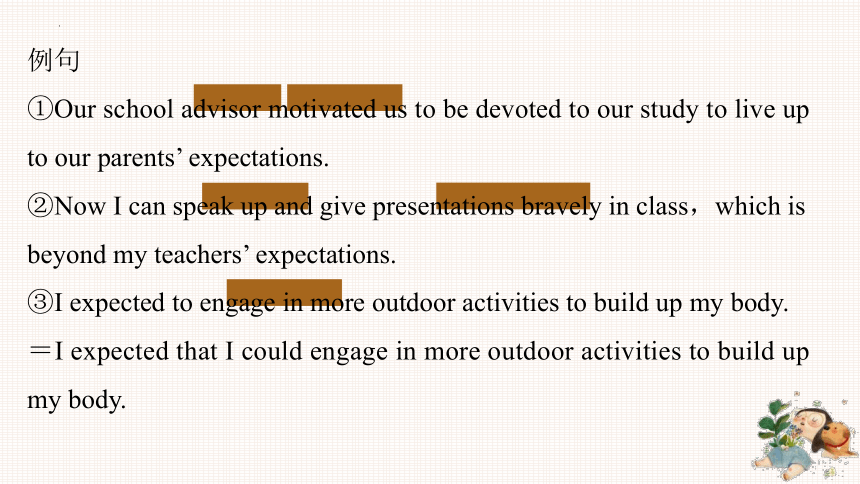

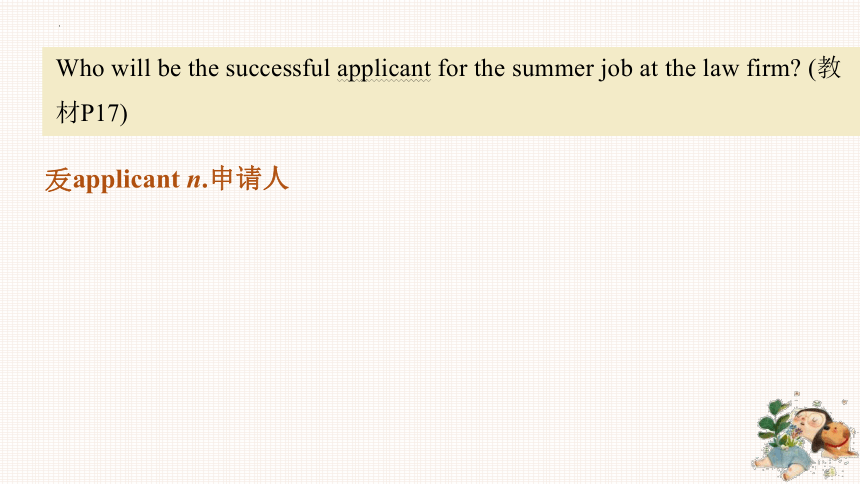
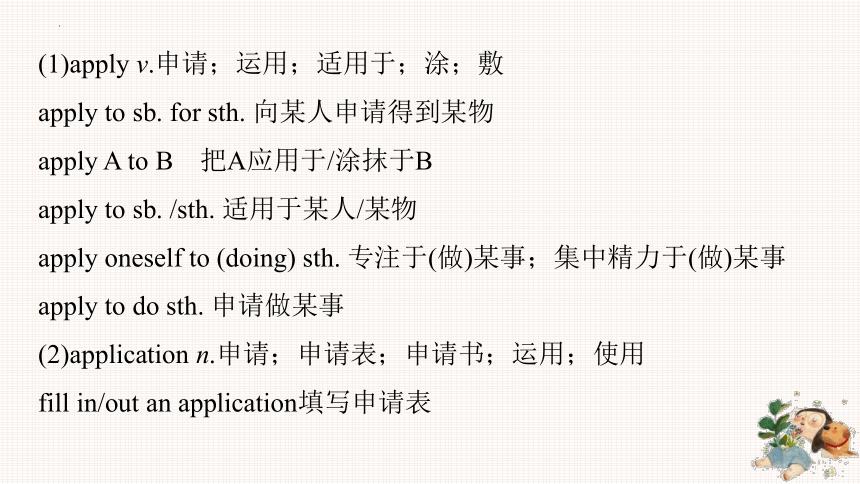
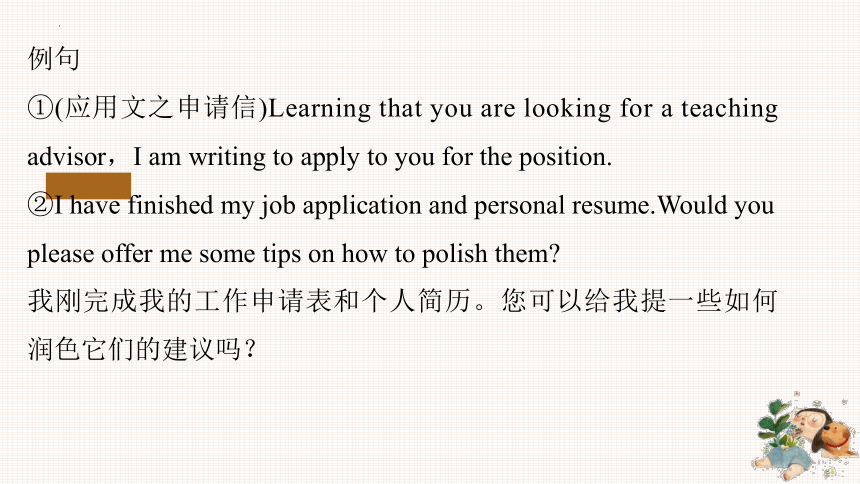
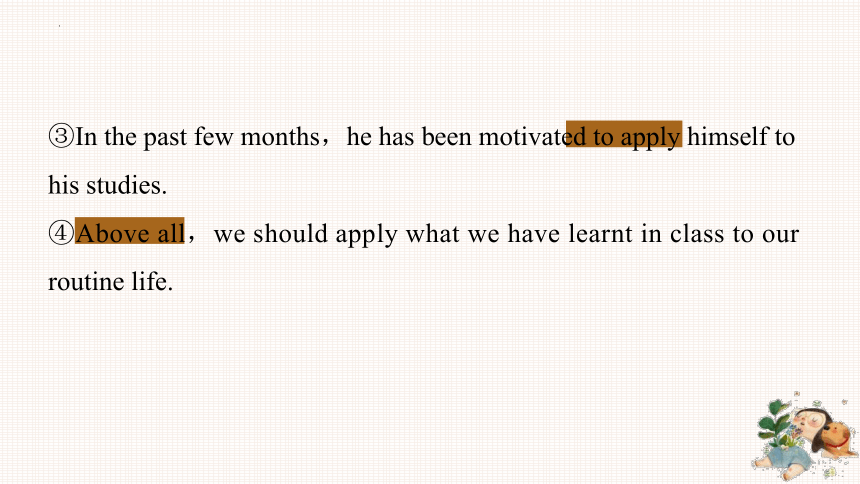
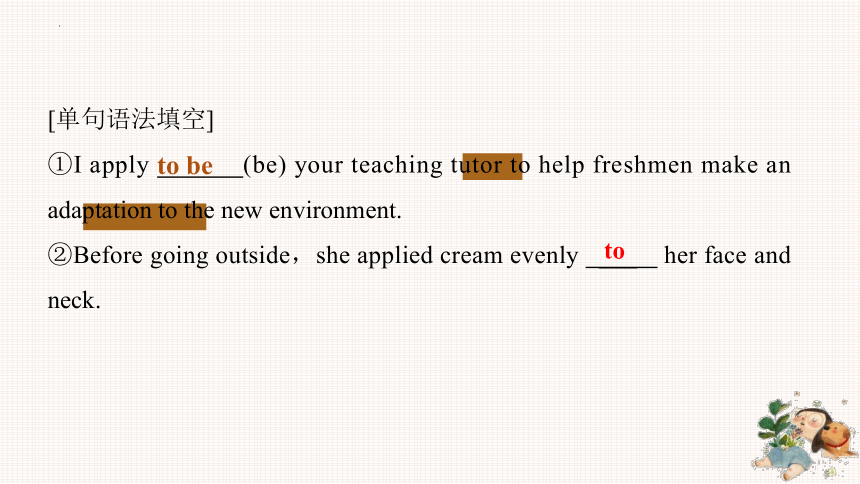
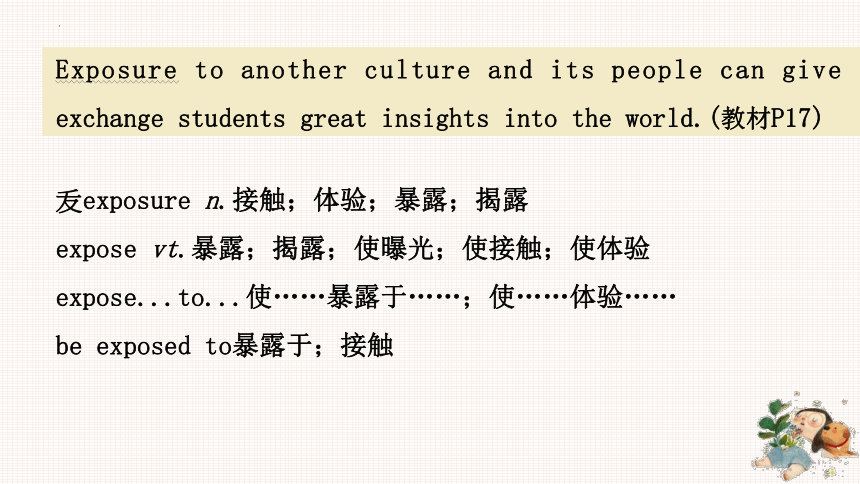

文档简介
(共40张PPT)
U2主语从句
Period Three Learning About Language
Learning Aims(学习目标)
1.Build up your vocabulary and learn the following language points:expectation,applicant,exposure.(重点难点)
2.Discover useful structures—Noun clauses.(重点难点)
The advisor talked about maintaining reasonable expectations when studying abroad.(教材P17)
?expectation n.期望;预期;期待
(1)meet/answer/come to/live up to one’s expectations不负某人所望
beyond (one’s) expectations出乎(某人)意料地
(2)expect v.期待;期望;预计
expect (sb. ) to do...期待(某人)做……
expect that...预料;预计……
例句
①Our school advisor motivated us to be devoted to our study to live up to our parents’ expectations.
②Now I can speak up and give presentations bravely in class,which is beyond my teachers’ expectations.
③I expected to engage in more outdoor activities to build up my body.
=I expected that I could engage in more outdoor activities to build up my body.
[完成句子]
①我丈夫和我期望用胡椒喷雾吓走这只凶恶的熊,但是白费功夫。
(2020·浙江7月)
My husband and I by using pepper spray,but in vain.
②正如所预料的那样,伯纳德没有顺利地卖掉爆米花,这使他非常沮丧。(2020·新高考全国Ⅰ)
,Bernard didn’t sell his popcorn smoothly,which made him quite frustrated.
expected to frighten away the fierce bear
As had been expected
Who will be the successful applicant for the summer job at the law firm (教材P17)
?applicant n.申请人
(1)apply v.申请;运用;适用于;涂;敷
apply to sb. for sth. 向某人申请得到某物
apply A to B 把A应用于/涂抹于B
apply to sb. /sth. 适用于某人/某物
apply oneself to (doing) sth. 专注于(做)某事;集中精力于(做)某事
apply to do sth. 申请做某事
(2)application n.申请;申请表;申请书;运用;使用
fill in/out an application填写申请表
例句
①(应用文之申请信)Learning that you are looking for a teaching advisor,I am writing to apply to you for the position.
②I have finished my job application and personal resume.Would you please offer me some tips on how to polish them
我刚完成我的工作申请表和个人简历。您可以给我提一些如何润色它们的建议吗?
③In the past few months,he has been motivated to apply himself to his studies.
④Above all,we should apply what we have learnt in class to our routine life.
[单句语法填空]
①I apply (be) your teaching tutor to help freshmen make an adaptation to the new environment.
②Before going outside,she applied cream evenly ___ her face and neck.
to be
to
Exposure to another culture and its people can give exchange students great insights into the world.(教材P17)
?exposure n.接触;体验;暴露;揭露
expose vt.暴露;揭露;使曝光;使接触;使体验
expose...to...使……暴露于……;使……体验……
be exposed to暴露于;接触
例句
①(话题写作之语言学习)Having been exposed to foreign teachers since a young age,I can communicate freely with others in English.
我从小就接触外教,因此我可以用英语自由地与他人交流。
②Being exposed to art and culture can enable us to appreciate beauty around us.
=Exposing ourselves to art and culture can enable us to appreciate beauty around us.
[单句语法填空]
①If often (expose) to the outside surroundings,you can make an adaptation to the unfamiliar environment with ease.
②There is no doubt that (expose) to sunlight can do harm to your skin.
exposed
being exposed
语法---主语从句
Activity 1
阅读下列句子,认真感悟加颜色部分,并完成方框下的小题
1.Laura says she always feels hungry when she smells it,so I taught her how to cook it,too.
2.The first time that she had to write an essay,her tutor explained that she must acknowledge what other people had said if she cited their ideas,but that he mainly wanted to know what she thought!
3.Xie Lei was confused because she thought she knew less than other people.
4.At first,Xie Lei had no idea what she should say,but what surprised her was that she found herself speaking up in class after just a few weeks.
5.What seemed strange before now appears quite normal to her.
1.以上各句都是主从复合句,句中使用了相当于 作用的从句(即名词性从句)在句中充当成分。
2.引导宾语从句的从属连词 有时可以省略,如句1和句3;两个并列的宾语从句中,第二个that 省略,如句2。
3.名词性从句可在句中作 ,如句4和句5。
4.名词性从句可在句中作 ,如句4。
5.名词性从句可在句中作 ,如句4。
名词
that
不可
主语
表语
同位语
Activity 2
定义:在句中起名词作用的从句,可以作为一个整体看待,其作用就相当于一个名词。
类别:主语从句;表语从句;同位语从句;宾语从句。
连接词:名词性从句通常用一个连接词和主句连接。
连接代词 what,which,who,whom,whatever,whichever,whoever,whomever等,在从句中作主语、宾语、表语、定语
连接副词 when,where,how,why等,在从句中作状语
从属连词 that,whether,if,as if/though等,在从句中不作成分
特点:名词性从句要用陈述语序,即:连接词+主语+谓语
At present I know how I can apply theory to practice.
What I should do now is grasp the precious chance.
一、主语从句(在复合句中作主句的主语)
1.that,whether引导的主语从句
That they should get well prepared for their future is obvious to the students.
=It is obvious to the students that they should get well prepared for their future.
显而易见,学生应该为自己的未来做好准备。
Whether he will succeed remains to be seen.
=It remains to be seen whether he will succeed.
他是否会成功还有待观察。
小结:that引导主语从句不可省略;whether可以引导主语从句,而if不可以。
2.以连接代词和连接副词引导的主语从句常保留各自的疑问词义
Why the fire broke out is still unknown.
=It is still unknown why the fire broke out.
人们仍然不知道这场大火为何会发生。
How he can learn to appreciate Chinese culture remains an important goal for him.
如何学会欣赏中国文化对他来说仍然是一个重要目标。
During this period,whatever people experience is fresh and exciting.
在这期间,人们所经历的任何东西都是新的、令人兴奋的。
What we can’t get seems better than what we have.
我们得不到的东西似乎比我们拥有的要好。
小结:如果主语从句过长,可以用it作形式主语。
3.it作形式主语还常有下列句型
It is+名词(a fact,a pity,a question,no wonder...)+that从句
It is+形容词(necessary,strange,important,possible...)+that从句
It is+过去分词(said,reported,decided,believed,suggested,ordered...)+that从句
It+动词(短语)(seem,happen,turn out,occur to...)+that从句
It is a pity that she has made such a silly mistake.
她犯了这样一个愚蠢的错误,真是遗憾。
It is very important that a student (should) learn English well.
学生学好英语很重要。
It is suggested that the meeting (should) be put off.
有人建议会议延期召开。
It seems that he is not quite himself today.
他今天好像不怎么舒服。
二、宾语从句(在复合句中作及物动词或介词的宾语)
1.作及物动词和介词的宾语
His tutor explained (that) he should read more books.
他的导师解释道他应该多读书。
I will do what/whatever I can (do) to help him.
我会尽我所能去帮助他。
I wonder whether/if they will come to our party.
我想知道他们是否会来参加我们的晚会。
She asked me whose handwriting was the best in the class.
她问我谁的书法是班上最好的。
A modern city has been set up in what was once a wasteland.
一座现代城市已经在曾是废墟的地方建起来了。
It depends on how we solve the problem.
这取决于我们如何解决这个问题。
2.it作形式宾语
常见结构有:
(1)find,consider,think,feel,believe,make+it+adj./n.+宾语从句
(2)enjoy,love,like,hate,appreciate,see to,insist on,depend on,rely on+it+宾语从句
I have made it clear that I will not accept this job.
我已经表明我不会接受这份工作。
I hate it when people ask me for money.
我不喜欢别人向我要钱。
I would appreciate it if you could consider my application.
如果您能考虑我的申请,我将不胜感激。
3.观察下列例句,总结宾语从句的特殊用法
(1)He told me (that) he had two sons and that they both had gone to college.
他告诉我他有两个儿子,他们都去上大学了。
(2)I’m thinking of whether we should go to see the film.
我正在考虑我们是否应该去看电影。
I can’t say whether or not they can come tomorrow.
我不敢说他们明天是否能来。
She didn’t know whether to go or to stay.她不知道是走还是留下。
总结:(1)当and 连接两个或者两个以上that引导的宾语从句时,只有第一个宾语从句可省略that,后面的宾语从句中的that不能省略。
(2)作介词宾语、与or not连用或与不定式连用时,只用whether不用if。
三、同位语从句
在复合句中用作同位语的从句称为同位语从句。它一般放在fact,news,idea,truth,hope,problem,information,belief,thought,doubt,promise,question等抽象名词的后面,对前面的名词作进一步的解释,或说明前面名词的具体含义。同位语从句通常由that引导,也可由whether引导,或由连接代词(what,which,who,whose等)和连接副词(when,where,why,how等)引导。
The news that they had won the game soon spread over the whole school.
他们比赛获胜的消息很快传遍了整个学校。
He hasn’t made the decision whether he will go there.
他还没有做出决定是否去那里。
I have no idea where he lives.
我不知道他住在哪里。
The question who should do the job requires consideration.
谁应该做这项工作的问题需要考虑。
同位语从句和定语从句的区别:
(1)从意义上看,同位语从句是对一个名词的具体内容加以解释说明;定语从句是对名词进行修饰限定。
(2)从结构上看,that引导同位语从句时,不作成分;that引导定语从句时作成分。
比较:He told me the news that our team won.(同位语从句)
He told me the news that was exciting.(定语从句)
四、表语从句(在复合句中作表语,位于系动词之后)(具体用法讲解见UNIT 1)
The trouble is that I have lost his address.
麻烦是我把他的地址弄丢了。
I was very angry.That was because he didn’t come.
我很生气,那是因为他没来。(强调原因)
He didn’t come.That was why I was very angry.
他没来,那就是为什么我很生气。(强调结果)
The reason why I was very angry was that he didn’t come.
我很生气的原因是他没来。
The question is whether he can make it.
问题是他能否成功。
练习
1. happened in my restaurant today was unbelievable.
This afternoon a poorly dressed gentleman came into my restaurant.Nobody knew 2. he was.3. surprised us was
4. he finished two orders of food in a very limited time.We wondered 5. he was so hungry.There was some doubt
6. the man was able to pay the bill.The gentleman asked
7. we would mind waiting for just a few minutes.
What
who
What
that
why
whether
if/whether
Then we were shocked to see 8. he took out of an envelope—a million pound bank note.I heard the news 9. __ two of this amount had been issued by the Bank of England.Hence,10.______
the gentleman showed us couldn’t be a fake.11. __ a gentleman with a million pound note was in rags and ate in our small restaurant was a big puzzle to all the people there.I really couldn’t describe 12.____ thrilled I was.
that
that
what
That
how
Thank you!
U2主语从句
Period Three Learning About Language
Learning Aims(学习目标)
1.Build up your vocabulary and learn the following language points:expectation,applicant,exposure.(重点难点)
2.Discover useful structures—Noun clauses.(重点难点)
The advisor talked about maintaining reasonable expectations when studying abroad.(教材P17)
?expectation n.期望;预期;期待
(1)meet/answer/come to/live up to one’s expectations不负某人所望
beyond (one’s) expectations出乎(某人)意料地
(2)expect v.期待;期望;预计
expect (sb. ) to do...期待(某人)做……
expect that...预料;预计……
例句
①Our school advisor motivated us to be devoted to our study to live up to our parents’ expectations.
②Now I can speak up and give presentations bravely in class,which is beyond my teachers’ expectations.
③I expected to engage in more outdoor activities to build up my body.
=I expected that I could engage in more outdoor activities to build up my body.
[完成句子]
①我丈夫和我期望用胡椒喷雾吓走这只凶恶的熊,但是白费功夫。
(2020·浙江7月)
My husband and I by using pepper spray,but in vain.
②正如所预料的那样,伯纳德没有顺利地卖掉爆米花,这使他非常沮丧。(2020·新高考全国Ⅰ)
,Bernard didn’t sell his popcorn smoothly,which made him quite frustrated.
expected to frighten away the fierce bear
As had been expected
Who will be the successful applicant for the summer job at the law firm (教材P17)
?applicant n.申请人
(1)apply v.申请;运用;适用于;涂;敷
apply to sb. for sth. 向某人申请得到某物
apply A to B 把A应用于/涂抹于B
apply to sb. /sth. 适用于某人/某物
apply oneself to (doing) sth. 专注于(做)某事;集中精力于(做)某事
apply to do sth. 申请做某事
(2)application n.申请;申请表;申请书;运用;使用
fill in/out an application填写申请表
例句
①(应用文之申请信)Learning that you are looking for a teaching advisor,I am writing to apply to you for the position.
②I have finished my job application and personal resume.Would you please offer me some tips on how to polish them
我刚完成我的工作申请表和个人简历。您可以给我提一些如何润色它们的建议吗?
③In the past few months,he has been motivated to apply himself to his studies.
④Above all,we should apply what we have learnt in class to our routine life.
[单句语法填空]
①I apply (be) your teaching tutor to help freshmen make an adaptation to the new environment.
②Before going outside,she applied cream evenly ___ her face and neck.
to be
to
Exposure to another culture and its people can give exchange students great insights into the world.(教材P17)
?exposure n.接触;体验;暴露;揭露
expose vt.暴露;揭露;使曝光;使接触;使体验
expose...to...使……暴露于……;使……体验……
be exposed to暴露于;接触
例句
①(话题写作之语言学习)Having been exposed to foreign teachers since a young age,I can communicate freely with others in English.
我从小就接触外教,因此我可以用英语自由地与他人交流。
②Being exposed to art and culture can enable us to appreciate beauty around us.
=Exposing ourselves to art and culture can enable us to appreciate beauty around us.
[单句语法填空]
①If often (expose) to the outside surroundings,you can make an adaptation to the unfamiliar environment with ease.
②There is no doubt that (expose) to sunlight can do harm to your skin.
exposed
being exposed
语法---主语从句
Activity 1
阅读下列句子,认真感悟加颜色部分,并完成方框下的小题
1.Laura says she always feels hungry when she smells it,so I taught her how to cook it,too.
2.The first time that she had to write an essay,her tutor explained that she must acknowledge what other people had said if she cited their ideas,but that he mainly wanted to know what she thought!
3.Xie Lei was confused because she thought she knew less than other people.
4.At first,Xie Lei had no idea what she should say,but what surprised her was that she found herself speaking up in class after just a few weeks.
5.What seemed strange before now appears quite normal to her.
1.以上各句都是主从复合句,句中使用了相当于 作用的从句(即名词性从句)在句中充当成分。
2.引导宾语从句的从属连词 有时可以省略,如句1和句3;两个并列的宾语从句中,第二个that 省略,如句2。
3.名词性从句可在句中作 ,如句4和句5。
4.名词性从句可在句中作 ,如句4。
5.名词性从句可在句中作 ,如句4。
名词
that
不可
主语
表语
同位语
Activity 2
定义:在句中起名词作用的从句,可以作为一个整体看待,其作用就相当于一个名词。
类别:主语从句;表语从句;同位语从句;宾语从句。
连接词:名词性从句通常用一个连接词和主句连接。
连接代词 what,which,who,whom,whatever,whichever,whoever,whomever等,在从句中作主语、宾语、表语、定语
连接副词 when,where,how,why等,在从句中作状语
从属连词 that,whether,if,as if/though等,在从句中不作成分
特点:名词性从句要用陈述语序,即:连接词+主语+谓语
At present I know how I can apply theory to practice.
What I should do now is grasp the precious chance.
一、主语从句(在复合句中作主句的主语)
1.that,whether引导的主语从句
That they should get well prepared for their future is obvious to the students.
=It is obvious to the students that they should get well prepared for their future.
显而易见,学生应该为自己的未来做好准备。
Whether he will succeed remains to be seen.
=It remains to be seen whether he will succeed.
他是否会成功还有待观察。
小结:that引导主语从句不可省略;whether可以引导主语从句,而if不可以。
2.以连接代词和连接副词引导的主语从句常保留各自的疑问词义
Why the fire broke out is still unknown.
=It is still unknown why the fire broke out.
人们仍然不知道这场大火为何会发生。
How he can learn to appreciate Chinese culture remains an important goal for him.
如何学会欣赏中国文化对他来说仍然是一个重要目标。
During this period,whatever people experience is fresh and exciting.
在这期间,人们所经历的任何东西都是新的、令人兴奋的。
What we can’t get seems better than what we have.
我们得不到的东西似乎比我们拥有的要好。
小结:如果主语从句过长,可以用it作形式主语。
3.it作形式主语还常有下列句型
It is+名词(a fact,a pity,a question,no wonder...)+that从句
It is+形容词(necessary,strange,important,possible...)+that从句
It is+过去分词(said,reported,decided,believed,suggested,ordered...)+that从句
It+动词(短语)(seem,happen,turn out,occur to...)+that从句
It is a pity that she has made such a silly mistake.
她犯了这样一个愚蠢的错误,真是遗憾。
It is very important that a student (should) learn English well.
学生学好英语很重要。
It is suggested that the meeting (should) be put off.
有人建议会议延期召开。
It seems that he is not quite himself today.
他今天好像不怎么舒服。
二、宾语从句(在复合句中作及物动词或介词的宾语)
1.作及物动词和介词的宾语
His tutor explained (that) he should read more books.
他的导师解释道他应该多读书。
I will do what/whatever I can (do) to help him.
我会尽我所能去帮助他。
I wonder whether/if they will come to our party.
我想知道他们是否会来参加我们的晚会。
She asked me whose handwriting was the best in the class.
她问我谁的书法是班上最好的。
A modern city has been set up in what was once a wasteland.
一座现代城市已经在曾是废墟的地方建起来了。
It depends on how we solve the problem.
这取决于我们如何解决这个问题。
2.it作形式宾语
常见结构有:
(1)find,consider,think,feel,believe,make+it+adj./n.+宾语从句
(2)enjoy,love,like,hate,appreciate,see to,insist on,depend on,rely on+it+宾语从句
I have made it clear that I will not accept this job.
我已经表明我不会接受这份工作。
I hate it when people ask me for money.
我不喜欢别人向我要钱。
I would appreciate it if you could consider my application.
如果您能考虑我的申请,我将不胜感激。
3.观察下列例句,总结宾语从句的特殊用法
(1)He told me (that) he had two sons and that they both had gone to college.
他告诉我他有两个儿子,他们都去上大学了。
(2)I’m thinking of whether we should go to see the film.
我正在考虑我们是否应该去看电影。
I can’t say whether or not they can come tomorrow.
我不敢说他们明天是否能来。
She didn’t know whether to go or to stay.她不知道是走还是留下。
总结:(1)当and 连接两个或者两个以上that引导的宾语从句时,只有第一个宾语从句可省略that,后面的宾语从句中的that不能省略。
(2)作介词宾语、与or not连用或与不定式连用时,只用whether不用if。
三、同位语从句
在复合句中用作同位语的从句称为同位语从句。它一般放在fact,news,idea,truth,hope,problem,information,belief,thought,doubt,promise,question等抽象名词的后面,对前面的名词作进一步的解释,或说明前面名词的具体含义。同位语从句通常由that引导,也可由whether引导,或由连接代词(what,which,who,whose等)和连接副词(when,where,why,how等)引导。
The news that they had won the game soon spread over the whole school.
他们比赛获胜的消息很快传遍了整个学校。
He hasn’t made the decision whether he will go there.
他还没有做出决定是否去那里。
I have no idea where he lives.
我不知道他住在哪里。
The question who should do the job requires consideration.
谁应该做这项工作的问题需要考虑。
同位语从句和定语从句的区别:
(1)从意义上看,同位语从句是对一个名词的具体内容加以解释说明;定语从句是对名词进行修饰限定。
(2)从结构上看,that引导同位语从句时,不作成分;that引导定语从句时作成分。
比较:He told me the news that our team won.(同位语从句)
He told me the news that was exciting.(定语从句)
四、表语从句(在复合句中作表语,位于系动词之后)(具体用法讲解见UNIT 1)
The trouble is that I have lost his address.
麻烦是我把他的地址弄丢了。
I was very angry.That was because he didn’t come.
我很生气,那是因为他没来。(强调原因)
He didn’t come.That was why I was very angry.
他没来,那就是为什么我很生气。(强调结果)
The reason why I was very angry was that he didn’t come.
我很生气的原因是他没来。
The question is whether he can make it.
问题是他能否成功。
练习
1. happened in my restaurant today was unbelievable.
This afternoon a poorly dressed gentleman came into my restaurant.Nobody knew 2. he was.3. surprised us was
4. he finished two orders of food in a very limited time.We wondered 5. he was so hungry.There was some doubt
6. the man was able to pay the bill.The gentleman asked
7. we would mind waiting for just a few minutes.
What
who
What
that
why
whether
if/whether
Then we were shocked to see 8. he took out of an envelope—a million pound bank note.I heard the news 9. __ two of this amount had been issued by the Bank of England.Hence,10.______
the gentleman showed us couldn’t be a fake.11. __ a gentleman with a million pound note was in rags and ate in our small restaurant was a big puzzle to all the people there.I really couldn’t describe 12.____ thrilled I was.
that
that
what
That
how
Thank you!
